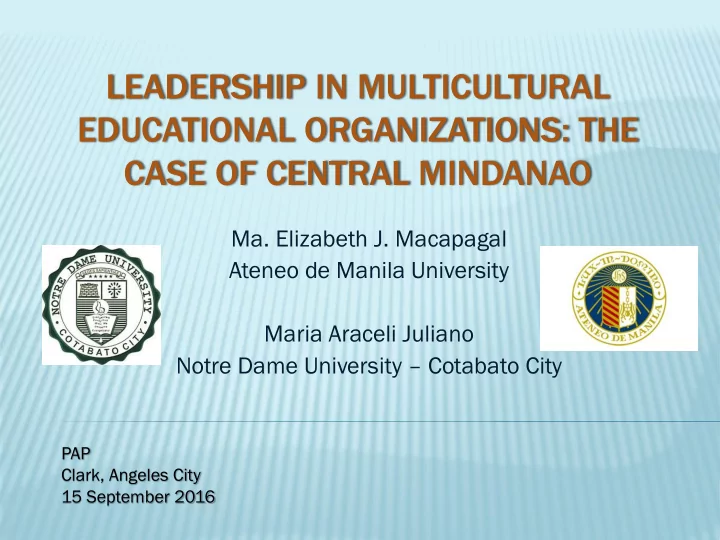

LEADERSHIP IN MULTICULTURAL EDUCATIONAL ORGANIZATIONS: THE CASE OF CENTRAL MINDANAO Ma. Elizabeth J. Macapagal Ateneo de Manila University Maria Araceli Juliano Notre Dame University – Cotabato City PAP Clark, Angeles City 15 September 2016
BACKGROUND OF THE STUDY Many educational institutions in Mindanao are multi-ethnic comprised of Muslim, Christian, and Indigenous students and faculty Among the more challenging areas of a school leader then is the delicate and emotion-laden issue of relations among different religious and ethnic groups. This study looks into the discourse of peace education among school leaders in public and private schools in Central Mindanao
OBJECTIVES OF THIS RESEARCH To add to the scarce literature on leadership, particularly in educational institutions with multicultural groups To discover how school leaders of multicultural institutions deal with a context of diversity To learn about their experiences working with multicultural groups and how they promote peace initiatives in their schools
METHODOLOGY Qualitative approach in-depth interviews were conducted Interview schedule covering leadership qualifications and character; experiences, obstacles/challenges encountered as leaders; peace initiatives All respondents gave their informed consent and were assured of confidentiality and anonymity
SAMPLE 10 females and 5 males mean age of 50 years old 4 Muslims, 1 Indigenous Person, and 10 Christians Respondents are school leaders from public and private schools in Maguindanao specifically from South Upi, Parang, and Cotabato City; and Sultan Kudarat mainly in Lebak and Kalamansig
STUDY SETTING
RESULTS
LEADERSHIP QUALIFICATIONS IN MULTICULTURAL EDUCATIONAL ORGANIZATIONS Themes Meaning Gaining Experience Respondents believed recommendations from Previous from higher authority (supervisors),and Leadership Positions leadership experience as Teacher-in- charge helped them gain position as school head (Principal). Importance of Training Many expressed that trainings, and Work Ethic professionalization through higher academic degrees (Masteral/Doctoral), and work attitudes prepared them for the challenges in their organizations
EXPERIENCES ENCOUNTERED AS LEADERS IN MULTICULTURAL EDUCATIONAL ORGANIZATIONS Them emes es Mea eani ning ng Harmonious Relationship Culture and religion were not with multicultural groups of issues among faculty and faculty and students students Supportive Community Parents, local organizations, and local government units are supportive of the school heads, and their programs especially for indigenous groups.
CHALLENGES ENCOUNTERED AS LEADERS Themes mes Meaning ning The Context of Poverty Students drop out of school especially those that belong to the Indigenous groups (Teduray, Manobo) because of early marriage. Students believe early marriage can help support their families financially. There were those who chose to work in the fields than enter school. Dominance of parents over Parents ruled cases of their children over school leadership competence policies. They recognized leader competence but insisted on personal demands. Like issues on grades of their children, discipline done by teachers to their children, etc. Conflict within groups and Leaders shared students relate peacefully with each outside among students other in school but they fight outside because of gang conflicts. There were instances of bullying within groups and outside groups like a Manobo against a fellow Manobo, Christians fearful of Muslims, Manobo against Teduray,etc.
LEADERSHIP CHARACTER Theme emes Meanin ning Equal, no segregation, ‘ pantay-pantay ’, open to them,very Equal treatment of Multicultural peaceful multicultural relations. Students are made to play Groups together, participate in all activities together including religious and socio-cultural activities; Students from different tribes compose a school Dance Troup (ALIWAN), participate together in all sports competitions, leadership trainings for all students, and a school council where all are represented including religious and civic sector representatives. Importance of Openness, having the heart for the minorities, Knowing Empathy where they (minorities) come from make leaders more understanding of their situations especially for the drop-outs Appealing to Social Being a Muslim or an IP as a leader helps. Parents listen, and trust leaders of the same tribal affiliation as theirs. Identity
PEACE INITIATIVES IN SCHOOLS Themes mes Meaning ning No Specific School Generally, leaders follow policies for all, no specific policies Policies for for the minorities but schools uphold the value of respect for others, and ‘no discrimination’ policy. They follow Minority Groups antibullying policies provided by the DepEd, and that the commission already provides curriculum specifically for the minorities including those from the National Commission for Indigenous People (NCIP). School programs They have Feeding programs, donations of school supplies, scholarships or sponsorships for the very poor, ‘ Gulayan ’ for Address Poverty the minorities including the teachers. Issues of multicultural groups No Specific Peace Generally, leaders have not initiated any concrete program Programs in School on peace but as described and exercised they believe their programs are all in pursuit of peace for their communities
IMPLICATIONS Resolving conflicts among multicultural groups in schools in Central Mindanao is not sufficient. Poverty issues have to be addressed as well. Leadership in multicultural organization is built on character and empathy for both the majority and minority groups not on religion nor cultural beliefs.
THEORETICAL IMPLICATIONS Results are consistent with the contact hypothesis (Allport, 1954) – equal status relationships, having common goals, intergroup cooperation, support of institutions and personal interaction with outgroup members are important in dealing with intergroup conflict in schools Social identity theory (Tajfel, 1979) – identifying with the same ethnic or religious group made it easier for the school leaders to deal with conflict issues
PRACTICAL IMPLICATIONS Special training and preparations specific to heading a multicultural educational institution may be helpful for future school leaders School leaders must continue to seek the support of the parents and community in order for their programs to succeed Perhaps multicultural schools can look into having policies for minority groups and specific programs to promote peace LGUs , and partner educational institutions are stronger partners in upholding programs for multicultural groups.
THANK YOU FOR LISTENING!
Recommend
More recommend